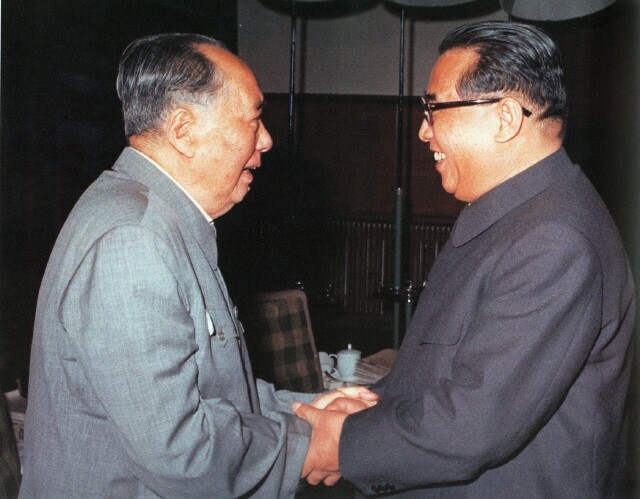hankyoreh
Links to other country sites 다른 나라 사이트 링크
In war of words with North Korean media, Chinese media takes aim at Kim Il-sung

Amid the war of words raging between North Korean and Chinese media outlets, one state-run Chinese media outlet is putting the pressure on North Korea with focused references to founding leader Kim Il-sung, who played a leading role in the strong alliance between North Korea and China. The media has even put forth theories regarding Kim Il-sung’s role in the Korean War.
The state-run China Daily cited Yang Xiyu, research fellow at the China Institute of International Studies, on a front page article from May 5, saying that “the Korean Central News Agency (KCNA) should check the facts showing Kim Il-sung and Kim Jong-il, former leaders of the DPRK, both supported denuclearization of the peninsula.”
The article went on to report that in June 2013 the North Korean Vice Foreign Minister, Kim Kye-gwan, said that “realizing denuclearization of the Korean Peninsula is the final wish of Kim Il-sung and Kim Jong-il,” and that in October of the same year the KCNA also said as much.
Even while further developing its nuclear program, North Korea has maintained—up until the death of leader Kim Jong-il in 2011—the position that “denuclearization was the final wish of Kim Il-sung,” then that “denuclearization was the final wish of Kim Il-sung and Kim Jong-il.” At the same time, North Korea has emphasized that denuclearization on the Korean Peninsula is not about North Korea unilaterally giving up its nuclear program, but that it includes the denuclearization of the area around the peninsula, and the resolution of the US threat. A July 2016 statement from a North Korean spokesperson similarly emphasized the “denuclearization final wish” while promising not to wield nuclear weapons as a threat, and simultaneously demanding the withdrawal of US forces from the Korean Peninsula.
China has long argued that for a solution to the North Korean nuclear issue, it is necessary to also find a solution for the interests of related parties, including North Korea and its demands. Yang Xiyu, who was interviewed by the China Daily, also argued in a separate contributing piece from January that even while thoroughly dismantling the nuclear weapons on the Korean peninsula, there needs to be a thorough solution to the reasonable concerns of North Korea in regards to security and the economy. The abrupt focussed mention of the “denuclearization final wish” by the Chinese state-run media, which is unlikely to be unaware of this historical context, is seen by some as the consequence of the recent battle between North Korean and Chinese state-run media outlets.
Even the overseas social media account of the Chinese Communist Party bulletin, the People’s Daily, published posts on May 4 criticizing Kim Il-sung’s role in the Korean War. The post questioned whether there would have been a war on the Korean Peninsula if Kim Il-sung had not attempted to unify the peninsula, and also claimed that because China was drawn into the war, tens of thousands of Chinese lives were lost, there followed 20 years of conflict between the US and China, and that even the Taiwan issue remained neglected. In short, that China has had to pay the price for most the North Korea’s rash, ill-advised actions. This is a clear deviation from the conventional Chinese view of the Korean War as a US attempt at expansion, and the idealization of China’s participation in the war as “helping North Korea and resisting the US.”
This sudden flare-up between the Chinese and North Korean media outlets could be a reflection of the worsened relations between the two countries. In this vein, in the field of international relations in China, there are some arguing for the need to reexamine China’s policy towards North Korea, including the China-North Korea alliance. Yet there still remain those with opposing views, who claim that while denuclearization may be important, the geopolitical value of North Korea and the Korean Peninsula is equally important.
By Kim Oi-hyun, Beijing correspondent
Please direct questions or comments to [english@hani.co.kr]

Editorial・opinion
![[Editorial] Does Yoon think the Korean public is wrong? [Editorial] Does Yoon think the Korean public is wrong?](https://flexible.img.hani.co.kr/flexible/normal/500/300/imgdb/original/2024/0417/8517133419684774.jpg) [Editorial] Does Yoon think the Korean public is wrong?
[Editorial] Does Yoon think the Korean public is wrong?![[Editorial] As it bolsters its alliance with US, Japan must be accountable for past [Editorial] As it bolsters its alliance with US, Japan must be accountable for past](https://flexible.img.hani.co.kr/flexible/normal/500/300/imgdb/original/2024/0417/6817133413968321.jpg) [Editorial] As it bolsters its alliance with US, Japan must be accountable for past
[Editorial] As it bolsters its alliance with US, Japan must be accountable for past- [Guest essay] Amending the Constitution is Yoon’s key to leaving office in public’s good graces
- [Editorial] 10 years on, lessons of Sewol tragedy must never be forgotten
- [Column] A death blow to Korea’s prosecutor politics
- [Correspondent’s column] The US and the end of Japanese pacifism
- [Guest essay] How Korea turned its trainee doctors into monsters
- [Guest essay] As someone who helped forge Seoul-Moscow ties, their status today troubles me
- [Editorial] Koreans sent a loud and clear message to Yoon
- [Column] In Korea’s midterm elections, it’s time for accountability
Most viewed articles
- 1[Column] The clock is ticking for Korea’s first lady
- 2Samsung barricades office as unionized workers strike for better conditions
- 3[Editorial] When the choice is kids or career, Korea will never overcome birth rate woes
- 4Why Israel isn’t hitting Iran with immediate retaliation
- 5[News analysis] After elections, prosecutorial reform will likely make legislative agenda
- 6[Editorial] Does Yoon think the Korean public is wrong?
- 7S. Korea, Japan reaffirm commitment to strengthening trilateral ties with US
- 8[Editorial] As it bolsters its alliance with US, Japan must be accountable for past
- 9Japan officially says compensation of Korean forced laborers isn’t its responsibility
- 10Faith in the power of memory: Why these teens carry yellow ribbons for Sewol